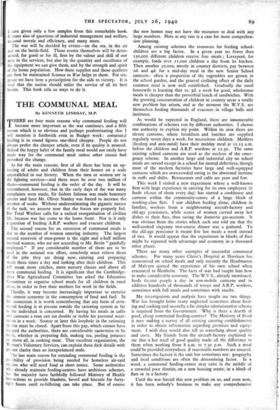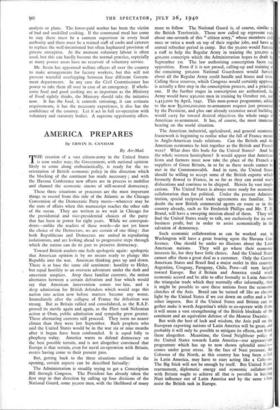THE COMMUNAL MEAL
By KENNETH LINDSAY, M.P.
T HERE are four main reasons why communal feeding will 1 become more important as the war continues, and a fifth reason which is so obvious and perhaps predominating that I will mention it forthwith even in Budget week: communal feeding is in round figures one-third cheaper. People do not always prefer the cheaper article, even if its quality is assured. Indeed the happy habit of the family meal would not easily have made way for the communal meal unless other causes had provoked the change.
As for the main reasons, first of all there has been an up- rooting of adults and children from their homes on a scale unparalleled in our history. When the men or women are in the fighting services—and there must be over two million of them—communal feeding is the order of the day. It will be remembered, however, that in the early days of the war many complaints were made, Sir Isidore Salmon was made honorary caterer and later Mr. Oliver Stanley was forced to increase the number of cooks. Without underestimating the gigantic nature of the task, we assume now that the forces are properly fed. But Total Warfare calls for a radical reorganisation of civilian life, because war has come to the home front. Nor is it only a question of feeding A.R.P. workers and evacuee children.
The second reason for an extension of communal meals is due to the number of women entering industry. The largest unused reservoir of man-power is the eight and a-half million married women, who are not according to Mr. Bevin "gainfully employed." If any considerable number of them are to be used in the national war effort, somebody must relieve them of the jobs they are doing now, catering and preparing meais three times a day and looking after their children. This will mean more crèches, more nursery classes and above all more communal feeding. It is significant that the Cambridge- shire War Agricultural Committee has asked the Education Committee to organise school meals for all children in rural areas, in order to free their mothers for work in the fields.
Thirdly, it may become increasingly important to exercise the utmost economy in the consumption of food and fuel. In thi,, connexion it is worth remembering that any form of com- munal feeding is at present outside the rationing system as far as the individual is concerned. By having his meals in cafes and canteens a man can eat double or treble his personal meat- ration in a week. Sooner or later this loophole in the rationing 5y em must be closed. Apart from this gap, which cannot have esc Ted the authorities, there are considerable eq.ononaies to be made, whether in preparing fish, making tea, peeling potatoes ix% above all, in cooking meat. That excellent organisation, the kX" men's Voluntary Services, can explain these dark details with gr, ler clarity than an inexperienced male.
"-he last main reason for extending communal feeding is the ibility of provision being needed for homeless air-raid ims who will need food at short notice. Some authorities 1A1- already maintain feeding-centres have ambitious schemes, bu. the majority have faithfully followed Ministry of Health insructions to provide blankets, bovril and biscuits for forty- eiala hours until re-billeting can take place. But of course the new homes may not have the resources to deal with any large numbers. Here at any rate is a case for more comprehen- sive planning.
Among existing schemes the resources for feeding school- children are a big factor. In a given year no fewer than 150,000 different children receive free meals ; Liverpool, for example, feeds over as,000 children a day from its kitchen. Then another so,000, mostly in country districts, pay between 2d. and 4d. for a mid-day meal in the new Senior School canteens: often a proportion of the vegetables are grown in the school garden, and the general civilising effect of the daily common meal is now well established. Gradually the rural housewife is learning that is. 3d. a week for good, wholesome meals is cheaper than the proverbial lunch of sandwiches. With the growing concentration of children in country areas a totally new problem has arisen, and at the moment the W.V.S. are themselves feeding thousands of evacuees in village halls and institutes.
As would be expected in England, there are innumerable combinations of schemes run by different authorities. I choose one authority to explain my point. Within its area there are eleven canteens, where breakfasts and lunches are supplied regularly seven days a week, for necessitous children. Mothers (feeding and ante-natal) have their midday meal at x1.15 a.m. before the children and A.R.P. wardens at 12.30. The same existing school canteens are used as the nucleus of the emer- gency scheme. In another large and industrial city no school meals are served except in a school for mental defectives, though most of the modern factories have large and well-equipped canteens which are overcrowded owing to the abnormal increase in staffs and shifts. Restaurants and cafés are poor and few.
This week I visited a new experiment where a well-known firm with large experience in catering for its own employees (it feeds a 8,000 of them every day) has started a cookhouse and canteen within the community-centre of a large block of working-class flats. I saw children feeding alone, children in families, workers from a neighbouring aircraft-factory and old-age pensioners, while scores of women carried away hot dishes to their flats, thus saving the domestic gas-account. It was obvious from the stories which each one told me that the well-cooked sixpenny two-course dinner was a godsend. To the old-age pensioner it meant five hot meals a week instead of two. It would appear that the experiment in blocks of flats might be repeated with advantage and economy in a thousand other places.
There are many other examples of successful communal schemes. For many years Christ's Hospital at Horsham has economised on school meals and only recently the Headmaster of Malvern quoted the experience of his own school when evacuated to Blenheim. The facts of war had taught him how to make considerable economy. The W.V.S., already mentioned, feeds 6o,000 people a day in non-mobile canteens and in addition hundreds of thousands of troops and A.R.P. workers, sometimes with full meals and sometimes with snacks.
My investigations and analysis have taught me two things. War has brought home many neglected economies about feed- ing and cooking and secondly a far simpler administrative scheme is required from the Government. Why is there a dearth of good, cheap communal feeding-centres? The Ministry of Food is now making a survey of all existing catering establishments in order to obtain information regarding premises and equip- ment. I wish they would also tell us something about quality and costs. My friends from the aircraft-factory explained to me that a hot meal of good quality made all the difference to them when working from 8 a.m. to 7.30 p.m. Such a meal could be provided everywhere if reasonable numbers are assured. Sometimes the factory is the unit but sometimes not: geography and local conditions are often the determining factor. In a word, a communal feeding-centre may exist in the middle of a crowded poor district, on a new housing estate, in a block of flats or in a factory.
Until the war forced this new problem on us, and even now, it has been nobody's business to make any comprehensive analysis or plans. The lower-paid worker has been the victim of bad and unskilled cooking. If the communal meal has come to stay there must be a canteen supervisor in every local authority and there must be a trained staff of cooks and caterers to replace the well-intentioned but often haphazard provision of private enterprise. At the moment voluntary labour is often used, but this can hardly become the normal practice, especially as many poorer areas have no reservoir of voluntary service.
Mr. Bevin has appointed welfare officers all over the country to make arrangements for factory workers, but this will not prevent wasteful overlapping between four different Govern- ment departments. In any case the Civil Commissioner has power to take them all over in case of an emergency. If whole- some food and good cooking are as important as the Ministry of Food rightly thinks, the Ministry should take the initiative now. It has the food, it controls rationing, it can estimate requirements, it has the necessary experience, it also has the confidence of the country. Let it act in full co-operation with voluntary and statutory bodies. A supreme opportunity offers.































 Previous page
Previous page